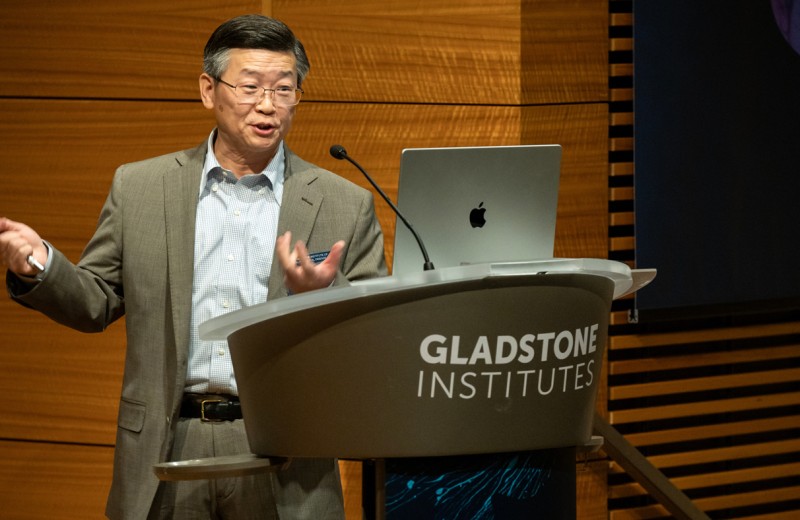Gladstone NOW: The Campaign Join Us on the Journey✕

How much you eat can influence your genes and affect how you age. Eric Verdin, MD, is researching ways to replicate this epigenetic trick with a drug. [Photo: Chris Goodfellow, Gladstone Institutes]
What if I told you there is a scientifically proven way to delay aging and increase longevity without taking a pill? All you have to do is stop eating.
Scientists have known for decades that calorie restriction has an anti-aging effect on the body; however, few of us are willing to sacrifice our dinner (and breakfast and lunch) to live an extra ten or twenty years. Fortunately, scientists—including my lab at the Gladstone Institutes—are researching ways to mimic these longevity-promoting effects.
How Calorie Restriction Affects the Body
Aging is controlled by both our genes and the environment. Having long-lived parents is a clear predictor of longer lifespan, demonstrating the role of genetics in aging. However, the environment and external factors such as diet, exercise, or pollutants can also affect our longevity. The focus of my laboratory is to identify the mechanisms by which the environment influences aging through the process of epigenetics.
Epigenetics refers to the regulation of genes by something other than DNA—i.e. factors that turn certain genes on or off in cells that share the same DNA. This epigenetic regulation takes place at the level of histones, a family of proteins that are tightly associated with DNA and regulate its function. These changes in gene expression can thereby affect how an individual ages.
Calorie restriction—which we define as either reducing caloric intake by 20-30% every day or fasting a couple of days a week—promotes longevity by triggering epigenetic changes that make the body more resilient to the usual damage and stress that comes with age. My laboratory has identified two epigenetic regulators that link calorie restriction with increased lifespan: NAD (and its relationship to sirtuins), and ketone bodies.
NAD and Sirtuins
One primary consequence of calorie restriction is to increase levels of the coenzyme nicotinamide adenine dinucleotide (NAD). NAD is a critical co-factor, or helper molecule, to a family of proteins called sirtuins. Sirtuins are “master regulator” proteins that act like the conductor of an orchestra; one area of control are genes that are involved in aging. Thus, manipulating levels of sirtuins with NAD sets off a cascade of events that ultimately influences whether aging-related genes are turned on or off, affecting the body’s protective response to aging.
Notably, aging is associated with a reduction in NAD, which in turn decreases the activity of sirtuins. Calorie restriction reverses this natural decline in NAD.
Ketone Bodies
Calorie restriction is also associated with an increase in the production of metabolites called ketone bodies. These metabolites are produced by the liver when our bodies use fat stores for energy, and they serve as an alternative fuel source during fasting or exercise. Similar to NAD and sirtuins, ketone bodies can regulate gene expression via epigenetics.
Ketone bodies protect cells from oxidative stress—the build-up of free radicals to toxic levels. As cells age, they become less effective at clearing free radicals, which can lead to cell damage reflective of the effects of aging. However, ketone bodies can help delay this process by inducing protective enzymes. Thus, ketone bodies indirectly help counteract oxidative stress, reversing components of aging.
Mimicking Fasting Without Calorie Restriction
Although eating less would improve the health of most people, reducing calories by 20-30% daily or fasting weekly are difficult goals to achieve. An alternative is to create a drug that mimics the epigenetic effects of calorie restriction.
Some progress in this area has already been made. For example, it is possible to increase levels of NAD and offset the cellular aging process by taking a vitamin supplement. Precursors to NAD—like nicotinamide riboside (NR) and nicotinamide mononucleotide (NMN)—can elevate NAD levels in the body. Indeed, animal models have shown that NR enhances longevity and protects against aging-related diseases.
My lab investigates ketone bodies with the goal of leveraging their positive effects on health. We are trying to understand how these factors work at a molecular level in order to develop new therapies that provide the same benefits as these metabolites, but without the burden of fasting. Currently, we are using small molecules to develop a precursor to ketone bodies that can be ingested and produce the same effects of calorie restriction. To date, our results in both healthy and diseased mice have been promising, and the chemical compound appears to increase longevity and reduce rates of disease.
There are also drugs already on the market that have been shown to increase lifespan. One example is metformin, a type 2 diabetes medication. Metformin mimics fasting by lowering adenosine triphosphate (ATP)—another source of cellular energy—which causes the same outcome in the cell as calorie restriction. This influence on cellular metabolism ultimately results in a similar epigenetic effect as increasing NAD levels, thereby regulating the genes involved in aging.
Studies in mice have shown that metformin can increase lifespan by ten percent, and human research has also produced encouraging findings. For example, in one study, diabetics who were taking metformin lived longer than healthy non-diabetics, a particularly remarkable result given that type 2 diabetes is considered to be a model for accelerated aging.
Disease Implications for Increasing Longevity
If we increase lifespan, it is imperative that we also improve health span. We want to live longer and stay healthy as we age.
Age is the strongest predictor of many major diseases, and the same pathways that determine longevity are also involved in chronic diseases of aging. This includes diabetes, heart disease, osteoporosis, stroke, some cancers, and neurodegenerative disorders like Alzheimer’s disease and Parkinson’s disease. As such, some of the therapies used against these conditions protect against aging and other age-related disorders. For example, in addition to treating diabetes, metformin is also thought to help prevent cardiovascular disease and various forms of cancer.
Harnessing aging-related chemical compounds in the human body may reveal new therapies for treating or preventing a variety of diseases. In addition, by focusing on aging, rather than targeting diseases one by one, we might be able to ameliorate, delay, or even avert many of these diseases simultaneously and have a compounding effect on people’s well-being and health.
Eric Verdin, MD, is the Associate Director of the Gladstone Institute of Virology and Immunology. He is also a Professor of Medicine at the University of California, San Francisco.
Want to Join the Team?
Our people are our most important asset. We offer a wide array of career opportunities both in our administrative offices and in our labs.
Explore CareersGladstone Presents Inaugural Sobrato Prize in Neuroscience to Yadong Huang, a Pioneer of Alzheimer’s Research
Gladstone Presents Inaugural Sobrato Prize in Neuroscience to Yadong Huang, a Pioneer of Alzheimer’s Research
The prize will be awarded annually to a Gladstone scientist who has made breakthrough discoveries in brain research; funds will help advance scientific discoveries from the lab to the clinic.
Awards News Release Alzheimer’s Disease Neurological Disease Huang Lab Aging Human GeneticsHope for Alzheimer’s: A Conversation with Gladstone’s Lennart Mucke
Hope for Alzheimer’s: A Conversation with Gladstone’s Lennart Mucke
Mucke, director of the Gladstone Institute of Neurological Disease, discusses what's next for Alzheimer’s research, the role of nonprofit research in developing new therapies, and why he's more hopeful than ever for a future where neurodegenerative diseases are fully treatable—and even preventable.
Alzheimer’s Disease Neurological Disease Mucke Lab AgingRyan Corces Joins Gladstone Institutes
Ryan Corces Joins Gladstone Institutes
A new lab to study the impact of lived experiences on developing Alzheimer’s disease
Institutional News News Release Profile Alzheimer’s Disease Data Science and Biotechnology Neurological Disease Corces Lab Aging



